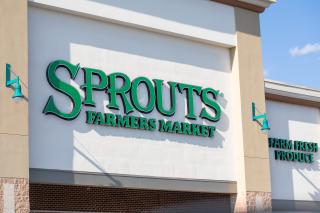Sprouts highlights climate initiatives, including smaller stores

- Sprouts Farmers Market has released its annual ESG report.
- The report highlights the grocer’s efforts to reduce its carbon footprint across the value chain.
- One way is through its new store prototype, which is smaller and will reduce energy consumption.
Sprouts Farmers Market on June 5 released its annual Environmental, Social and Governance (ESG) report, which, in part, highlights its efforts to become a more sustainable business.
As Retail Leader previously reported, Sprouts this year shared plans to close about a dozen stores as it focuses on expanding its smaller concept. Sprouts’ new stores are about 23,000 square feet smaller than its previous store design — one way the natural- and organic-focused grocer is reducing its carbon footprint. According to its ESG report, the new, smaller stores will help the retailer reduce emissions on a per-store basis.
Sprouts also said it was investing in other technologies to reduce its carbon footprint, including LED lighting, energy management systems, efficient refrigeration tech and tech that detects refrigeration system leaks. Sprouts in the report noted most of its emissions come from the Scope 3 category, which includes emissions created along the value chain by the products it sells in-store.
As part of its efforts to cut back Scope 3 emissions, Sprouts said it plans to build new stores within 250 miles of its distribution centers to reduce its transportation-related emissions. Last year, Sprouts said 82% of its outbound transportation partner miles were fulfilled by EPA SmartWay-certified carriers, meaning the carriers “measure, benchmark and track their efforts to increase efficiency and fuel economy” in line with EPA guidelines, according to the agency.
Last year, Sprouts said 39% of the energy it used was sourced from clean and/or renewable sources. Sprouts said:
- 45% of energy came from gas.
- 15% from coal.
- 12% from nuclear.
- 10% from wind.
- 8% from solar.
- 6% from hydro.
- 2% from biomass.
- 2% from geothermal.
Other efforts Sprouts highlighted in the report include its efforts to become a zero waste company by 2030, meaning 90% or more waste is diverted from landfill. In 2022, Sprouts’ landfill diversion rate was 69%, up from 64% and 58% in 2021 and 2020, respectively..
Sprouts is also focused specifically on reducing food waste. In 2022 it said it recovered — donated or sent to local farms and compost facilities — 87% of all food waste generated, up from 78% in 2021 and 68% in 2020. Sprouts in the report noted it plans to remove single-use plastic and paper bags from its stores and all non-recyclable polystyrene from its meat department by the end of the year, as Retail Leader previously reported.
“We talk a lot at Sprouts about ‘doing well by doing good,’” Sprouts Farmers Market’s CEO Jack Sinclair wrote in a letter to stakeholders. “To us this means executing on our strategy and delivering value to our owners while doing the right thing for all stakeholders — our team members, customers, communities, vendor partners and the planet we all share. We do not believe in sacrificing one for any other, and the success we saw in 2022 is a demonstration of this philosophy in action.”
Sustainability has become more important than ever to retailers, brands and consumers alike. As Retail Leader Pro previously reported, consumers are more often spending at retailers and with brands that invest in sustainability and with other ESG-related causes that align with their own values. Consumers are becoming more health- and environmentally conscious, and more often consider the impact of their food choices at retail.

